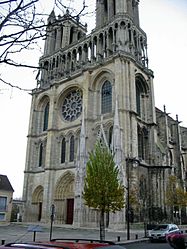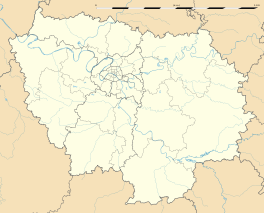Mantes
| Mantes-la-Jolie | ||
|---|---|---|

The Collegiate Church of Our Lady, in Mantes
|
||
|
||
| Coordinates: 48°59′27″N 1°43′02″E / 48.9908°N 1.7172°ECoordinates: 48°59′27″N 1°43′02″E / 48.9908°N 1.7172°E | ||
| Country | France | |
| Region | Île-de-France | |
| Department | Yvelines | |
| Arrondissement | Mantes-la-Jolie | |
| Canton | Mantes-la-Jolie | |
| Intercommunality | Mantes-en-Yvelines | |
| Government | ||
| • Mayor (2014–2020) | Michel Vialay | |
| Area1 | 9.38 km2 (3.62 sq mi) | |
| Population (2006)2 | 42,365 | |
| • Density | 4,500/km2 (12,000/sq mi) | |
| Time zone | CET (UTC+1) | |
| • Summer (DST) | CEST (UTC+2) | |
| INSEE/Postal code | 78361 /78200 | |
| Elevation | 17–41 m (56–135 ft) (avg. 34 m or 112 ft) |
|
|
1 French Land Register data, which excludes lakes, ponds, glaciers > 1 km² (0.386 sq mi or 247 acres) and river estuaries. 2Population without double counting: residents of multiple communes (e.g., students and military personnel) only counted once. |
||
1 French Land Register data, which excludes lakes, ponds, glaciers > 1 km² (0.386 sq mi or 247 acres) and river estuaries.
Mantes-la-Jolie (French pronunciation: [mɑ̃t.la.ʒɔ.li], often informally called Mantes) is a commune based in the Yvelines department in the Île-de-France region in north-central France. It is located in the western suburbs of Paris, 48.4 km (30.1 mi) from the center of Paris. Mantes-la-Jolie is a subprefecture of the department.
Mantes was half way between the centres of power of the dukes of Normandy at Rouen and the Kings of France at Paris. Along with most of northern France, it changed hands frequently in the Hundred Years' War. Philip Augustus died at Mantes, 14 July 1223.
Louis XIV instituted the manufacture of musical instruments in Mantes, and it was chosen as the centre of brass and woodwind instrument manufacture. In the 19th century, painters were attracted to the town, particularly Corot, whose paintings of the bridge and the cathedral are celebrated. Prokofiev spent the summer of 1920 there orchestrating the ballet Chout.
Originally officially called Mantes-sur-Seine (meaning "Mantes upon Seine"), Mantes merged with the commune of Gassicourt in 1930 and the commune born of the merger was called Mantes-Gassicourt.
...
Wikipedia



